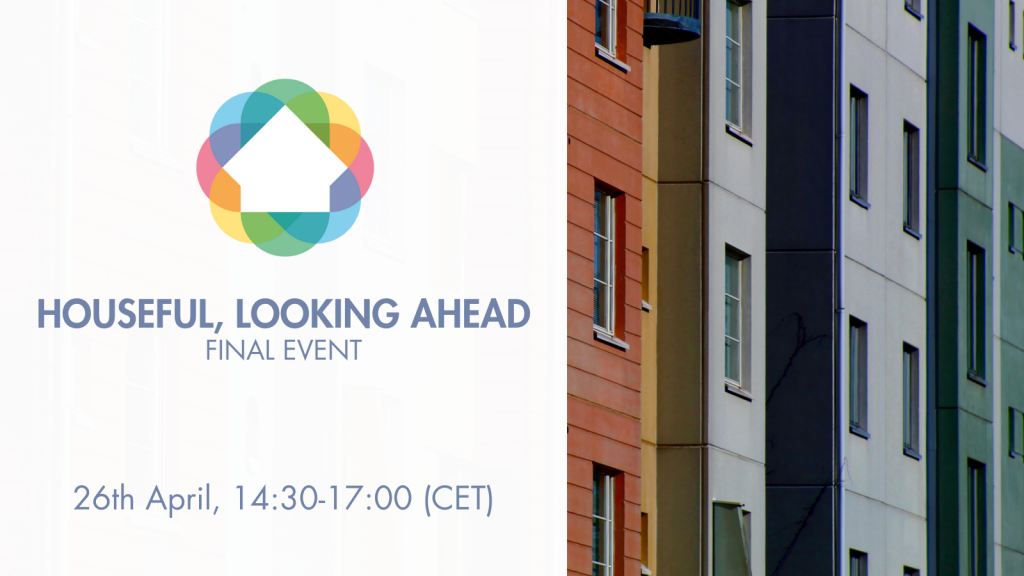The HOUSEFUL project is coming to an end and to celebrate it, the consortium has organised an online session open to the public on Wednesday 26 April. After five years of research and development in circular economy applied to the housing sector, this meeting will serve as a loudspeaker for the agents involved in the project to share the knowledge acquired through these years and to analyse the steps that have guided them during each of the stages.
The aim of this meeting is to bring together in the same space professionals from the construction, water, circular economy and political representatives at European level, to review the project and establish a space in which to create synergies with which to put into practice all that has been acquired.
The HOUSEFUL project proposes a new future in the housing sector at European level through the circular economy with the development and demonstration of an integrated systemic service composed of 11 circular solutions co-created by the agents involved in the housing value chain process. The circular economy is intended to be embedded in the management of water, energy and materials used throughout the life cycle of buildings.
The aim of this project has been to develop a methodology to quantify the degree of circularity of buildings in the different phases that make up their life cycle, to demonstrate and validate the project methodology at laboratory scale and at large scale in four European buildings, to ensure the marketability of HOUSEFUL circular solutions as an integrated systemic service and to develop a software as a Service for the replication of the services in the housing sector.
The CARTIF team involved in this proposal has been in charge of the development of a methodology for the assessment of circularity in the housing sector, co-creating actions of the HOUSEFUL services, of large scale demonstrators in buildings, as well as providing the HOUSEFUL Solutions as a Service.
The solutions of the HOUSEFUL project have been demonstrated in the 4 demonstration buildings in Spain and Austria. Through the 4 vectors of the project (energy, water, waste and materials) the different HOUSEFUL Solutions have been successfully implemented: reuse of grey water and rainwater thanks to its treatment with Natural Solutions (NBS), biogas production through the joint treatment of sewage and domestic waste, composting of bio-waste for its use as bio-fertilizer, integral reform of one of the buildings to improve its efficiency through the use of more sustainable materials, among others, are some of the results obtained throughout the 60 months of the project. In addition, HOUSEFUL has also worked in the social sphere by collaborating with neighbourhood associations and town councils to make decisions in each of the demonstrations.
Agenda
First session – “Houseful unpacked”
- 14.30-14.35: Introduction to the final event
- 14.35-14.50 Houseful: what we learned (Carolina Carbò, LEITAT)
- 14.50-15.05: From local to EU level: Putting the circular transition on a solid footing (Dara Turnbull, Housing Europe)
- 15.05-15.20: Lessons from co-creating in Houseful (Beatriz Medina, We&B)
- 15.20-15.35: A new digital platform to help housing stakeholders work together (Albert Torres, IRIS)
- 15.35-15.50: Q&A
- 15.50-15.55: Conclusions
Moderator: Marta Escamilla (Sustainability Manager at LEITAT)
Second sessions – “UE End-of-Waste status for the value chain Water and Construction”
- 16.00-16.05: Introduction to the institutional roundtable
- 16.05-16.35: A dialogue between Milo Fiasconaro, Executive Director at Aqua Publica Europea, and Christophe Sykes, General Director at Construction Products Europe.
- 16.35-16.45: Q&A
Moderator: Dara Turnbull, Research Coordinator at Housing Europe
Final conclusions
16.45 – 17.00: Final remarks and thanksgiving (Carolina Carbò, LEITAT)
